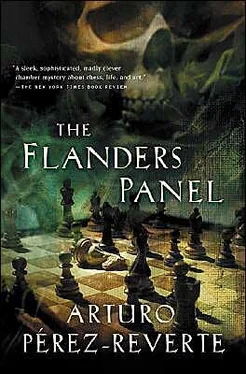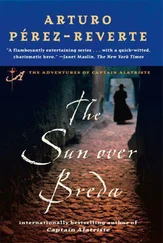“Don’t you think the price for that was rather high? Alvaro, Menchu… you yourself.”
Cesar seemed to search his memory, as if it were an effort to remember the person Julia was referring to. “Ah, yes, Menchu,” he said at last, and frowned. “Poor Menchu, caught up in a game that was much too complex for her. Though, if you’ll forgive the immodesty, her case was a brilliant bit of improvisation. When I phoned you first thing that morning, to see how everything had worked out, Menchu answered and said you weren’t there. She seemed in a hurry to hang up, and now we know why. She was waiting for Max to carry out their absurd plan to steal the painting. I knew nothing about it, of course. But as soon as I put the phone down, I knew what my next move should be: Menchu, the painting. Half an hour later I rang the bell, in the guise of the woman in the raincoat.”
At this point, Cesar looked amused, as if trying to get Julia to see the oddly funny side of the situation he was describing.
“Princess,” he continued, arching one eyebrow, “I always told you that you should get one of those spy holes in your door – very useful if you want to know who’s calling. Menchu might not have opened the door to a blonde woman in dark glasses. But all she heard was Cesar’s voice telling her he had an urgent message from you. She had no alternative but to open the door, and she did.” He turned his hands palm up, as if in posthumous apology for Menchu’s mistake. “I imagine that at that moment she thought her plan with Max was about to be ruined, but her concern turned to surprise when she saw a strange woman standing on the doorstep. I just had time to see the startled look in her eyes before giving her a punch in the throat. She died without knowing who her killer was, I’m sure. I shut the door and set about preparing everything. Then – and this I didn’t expect – I heard the sound of a key turning in the lock.”
“Max,” said Julia unnecessarily.
“Indeed. It was the handsome pimp, who, as I learned later, when he told you the whole story at the police station, was making his second call of the morning, in order to take the painting away before Menchu set fire to your apartment. An absolutely ridiculous plan, by the way, but typical of Menchu and that fool.”
“It could have been me at the door. Did you think of that?”
“I must confess that when I heard the key in the lock, I thought it was you.”
“And what would you have done? Punched me in the throat too?”
He looked at her again with the pained expression of one unjustly used.
“Such a question,” he said, looking for an appropriate response, “is both cruel and monstrous.”
“Really?”
“Yes, really. I don’t know exactly how I would have reacted. But the fact is, I felt lost, and all I could think of was to hide. I ran into the bathroom and held my breath, trying to come up with a way of getting out of there. But nothing would have happened to you. The game would simply have ended halfway through. That’s all.”
Julia stuck out her lower lip, feeling words burning in her mouth.
“I don’t believe you, Cesar. Not any more.”
“Whether you believe me or not, my dear, doesn’t change a thing.” He made a resigned gesture, as if the conversation were beginning to weary him. “At this stage it really doesn’t matter. What counts is that it wasn’t you, but Max. I heard him saying: ‘Menchu, Menchu’. He was terrified, but he didn’t dare cry out, the villain. I’d calmed down by then. I had a dagger in my pocket, the Cellini you’ve often seen. And if Max had begun sniffing round the rooms, he would have encountered that knife in the most stupid way possible, right in his heart, suddenly, before he could say a word. Luckily for him, and for me, he didn’t have the courage but chose instead to run off. Such a hero.”
He paused and sighed, but not boastfully.
“He owes his life to that, the cretin,” he added, getting up from his chair. Once on his feet, he looked at Julia and Munoz, both of whom were watching him, and wandered round the room, the carpets muffling his footsteps.
“I should have done what Max did and run away as fast as I could, since, for all I knew, the police could have been about to arrive. But what we might call my artistic honour got the better of me, and I dragged Menchu into the bedroom and… well, you know what happened. I rearranged the decor a bit, certain that Max would get the blame. It took five minutes.”
“Why did you have to do that with the bottle? It was completely unnecessary. Disgusting and horrible.”
Cesar tutted. He’d paused before one of the paintings hanging on the waif, Man by Luca Giordano, and was looking at it as if he expected the god, encased in the gleaming metal of his anachronistic medieval armour, to provide an answer.
“The bottle,” he murmured without turning to face them, “was a complementary detail. A final inspirational touch.”
“It had nothing to do with chess,” Julia pointed out, and her voice had the cutting edge of a razor. “More of a settling of accounts… with all women.”
Cesar turned slowly round to her. His eyes this time neither begged indulgence nor hinted at irony; they were, instead, distant, inscrutable.
“Then,” he said at last, in an absent tone and as if he hadn’t heard what Julia had said, “I used your typewriter to type out the next move, picked up the painting wrapped up by Max and left with it under my arm. And that was that.”
He’d been speaking in a neutral voice, as if the conversation was no longer of any interest to him. But Julia was far from considering the matter closed.
“But why kill Menchu? You could come and go in my apartment whenever you wanted. There were a thousand other ways of stealing the painting.”
That comment brought a spark of life back into Cesar’s eyes.
“I see, Princess, that you’re determined to give the theft of the Van Huys an exaggerated importance. In fact, it was just another detail. Throughout this whole affair I did some things simply because they complemented others. The icing on the cake, if you like,” he said, struggling to find the right words. “There were several reasons Menchu had to die: some are irrelevant now and others aren’t. Let’s say they go from the purely aesthetic, and that’s how our friend Munoz made his astonishing discovery of the link between Menchu’s surname and the rook that was taken, to other deeper reasons. I’d organised everything to free you from pernicious ties and influences, to cut your links with the past. Unfortunately for her, Menchu, with her innate stupidity and vulgarity, was one of those links, as was Alvaro.”
“And who gave you the power over life and death?”
Cesar gave a Mephistophelian smile.
“I did, all on my own. And forgive me if that sounds impertinent.” He seemed suddenly to recall the presence of Munoz. “As regards the rest of the game, I didn’t have much time. Munoz was like a bloodhound sniffing out my trail. A few more moves and he would point the finger at me. But I knew our dear friend wouldn’t intervene until he was absolutely certain. On the other hand, he was sure by then that you weren’t in any danger. He’s an artist too, in his way. That’s why he let me continue, while he looked for proofs that would confirm his analytical conclusions. Am I right, friend Munoz?”
Munoz’s only reply was to nod slowly. Cesar had gone over to the small table on which the chess set stood. After observing the pieces for a while, he delicately picked up the white queen, as if it were made of fragile glass, and looked at it for a long time.
“Yesterday evening,” he said, “while you were working in the studio at the Prado, I got to the museum ten minutes before it closed. I hung about in the rooms on the ground floor and planted the card on the Brueghel painting. Then I went to have a coffee to while away the time before I could phone you. That was all. The only thing I couldn’t foresee was that Munoz would dust off that old chess magazine in the club library. I had forgotten its existence.”
Читать дальше












